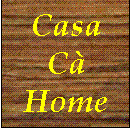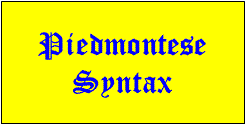


Piedmontese Grammar
In this last part of our little piedmontese grammar we will see Conjunctions and Exclamations.
We finish our speech on piedmontese grammar, and we note that Piedmontese, as all the languages (and even more) is a language that can be learned by experience. It has a great richness of expressions, given by the difference in words and way of saying that can be found on the piedmontese territory.
From the last parts of this work, probably, it is evident the hurry of finishing this first "release". I aplogize, but the scope was mainly to stimulate curiosity about the Piedmontese. Many authors "actually skilled" in Piedmontese have done important works, and certainly it worth while having a look at them.
We aplogize also for errors (maybe there are some big), and we will be grateful if someone, able to correct them, were so kind to let us know.
Something more will be seen in Syntax.
Also for conjunctions there are not specific particularities. Some difference in using them will be seen in Syntax. We just note the very frequent use of the conjunction "che" ="that", and sometimes the use of a pair of conjunctions.
Conjunctions can be classified in simple and composite, consecutive, consecutive-negative, widening, explanatory.
We report here some examples, (with associated pronunciation) and for a complete list see the vocabulary.
Simple conjunctions
e \e\ = and
o, ò \o\ = or (note the pronunciation, always the same even if the accent is missing)
se \se\ = if
ma \m&\ = but
anche \'&[ng]ke\ = also
ëdcò \&dc'o\ = also
ansi \'&[ng]si\ = on the contrary, not at all
ché \k'e\ = since
che \k'e\ = that
përche \p&rk'æ\ = because, why
coma, com \c'um&, cum\ = as
donca \d'u[ng]c&\ = so, therefore
pen-a \p'æ[ng]&\ = as soon as
dësnò \d&sn'o\ = otherwise
macassìa \m&c&s'i&\ = anyway
comsëssìa \cums&s'i&\ = anyway
tutun \t[ue]t'[ue][ng]\ = however
antërtant \&nt&rt'&nt\ = in the meanwhile
antramentre \&ntr&m'æntre\ = while, while that
etc.
Composite conjunctions
basta mach \b'&st& m'&c\ = provided that, so long as
bele che \b'ele ke\ = even if
combin che \cumb'i[ng] ke\ = although
contut che \cunt'[ue]t ke\ = although, though
a la mira che \& l& m'ir& ke\ = up to
se 'd nò \se d n'o\ = otherwise
ëd vòlte mai \&d v'olte m&i\ = in case, if
etc.
Consecutive conjunctions
ò... ò... \o... o...\ = either ... or ...
tant... coma... \t&nt... c'um&...\ = as ... as ...
etc.
Consecutive negative conjunctions
ni... ni... \ni... ni...\ = neither ... nor ...
né... né... \ne... ne...\ = neither ... nor ...
etc.
Widening conjunctions
nen mach... ma 'dcò... \næ[ng] m&k ... m& dc'o\ = not even ... but also ...
etc.
Explanatory conjunctions
vis-a-dì \viz&d'i\ = that is, i.e.
etc.
In Piedmontese there are many exclamations that are specific of the language, together with exclamations that are more or less common to other languages. We report here, mainly, the ones "Piedmontese specific". Often it is not possible to translated them, so we will give an approximate meaning, and the feelings that they express. The list here is very short with respect the many available in Piedmontese.
contacc \cunt'&[ch]\ = by Jove. Good for all circumstances (Used by King Charles Albert).
cribio \cr'ibiu\ = cripes. Surprise and annoyance, with acridity.
dincinato \cr'ibiu\ = gosh. Anger and annoyance.
sacramondo \s&cr&m'undu\ = damn!. Anger and annoyance, quite rude
òmmi \'ommi\ = alas. Surprise and annoyance, without acridity.
aidemì \&idem'i\ = alas. Bad surprise, moan.
fable \f'&ble\ = cripes. Surprise.
tèh \tæ\ = pshaw. Surprise.
darmagi \d&rm'&ji\ = what a pity. Regret.
s-ciao \s[ch]i'&u\ = no matter!, leave it to go!. Resignation without regret.
etc.
Exclamative locutions
They are composite exclamations having a particular character in Piedmontese. Here we give only some few examples.
ancora pro\&[ng]c'ur& pr'u\ = how lucky. Something good in many bad things.
che scheur\ke sk'[oe]r\ = what a disgust!.
òh mi povròm\'o mi puvr'om\ = me poor! (literally oh me poor man).
mi pòvra dòna\mi p'ovr& d'on&\ = me poor! (feminine) (literally me poor woman).
These two last exclametions are very common. Note the different construction for the two genders, given by aesthetical reasons. ch'a disa\c& d'iz&\ = please tell me (literally that he tell me).
this expression follows from the fact that in Piedmontese the formal way to address to people is to use the third singular person (in some cases the second plural person - see Syntax -) using the subjunctive. the preposition "che" (ch') is required.
etc.
Particular locutions
Locutions that in English sound "how stupid of you!, How it was fine!", and so on, and in Italian sound "Quanto sei scemo ! , Come era bello !", and so on, in Piedmontese are translated with a construction very close the the one of French:
Ch'it ses fòl ! , ch'a l'era bel ! (literally " that you are stupid!, that it was fine!)
Otherwise they can use a similar construction:
S'it ses fòl ! , s'a l'era bel ! (literally " if you are stupid!, if it was fine!)
False exclamations - greetings
We finish with a series of greetings in Piedmontese.
Friendly:
ciao \[ch]i&u\ = good bye
adiù \&di'[ue]\ = good bye, farewell
it saluto \it s&l'[ue]tu\ = good by, I greet you
arvëdse \&rv'&dse\ = see you again
etc.
Formal
bondì \bund'i\ = good day
bon-a sèira \bu[ng]& s'air&\ = good evening
bon-a neuit \bu[ng]& n'[oe]it\ = good night
cerèa \cer'a&\ = generical and very used
etc.
Also about this point see Syntax.

